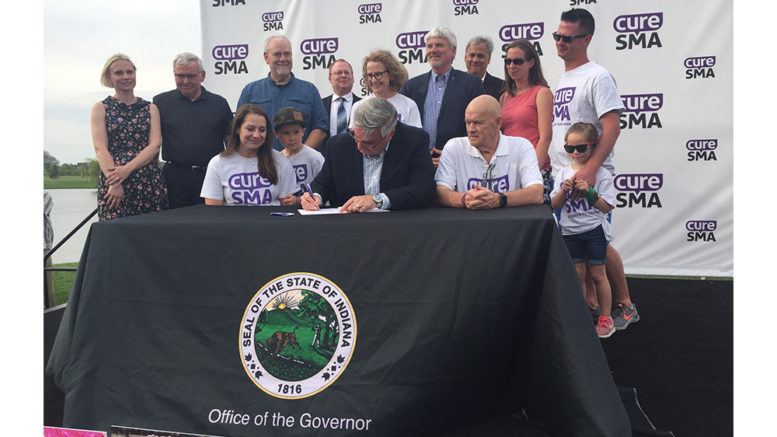On Friday, Gov. Eric Holcomb ceremonially signed into law new legislation at the Cure SMA Walk-N-Roll event in Carmel. The bill, which adds two tests to Indiana’s newborn screening panel, was authored by State Rep. Douglas Gutwein (R-Francesville) and co-authored by State Rep. Donna Schaibley (R-Carmel).
This new law requires spinal muscular atrophy (SMA) and severe combined immunodeficiency (SCID) to be added to the list of screenings newborns receive in Indiana shortly after their births. These screenings identify diseases in newborns, providing opportunities for early interventions that can prevent death or the need for long-term care.
“I am totally overwhelmed by the support that this legislation received,” Gutwein said. “Making this testing automatic for newborns means physicians can begin a treatment plan almost immediately. I am very excited we were able to have a ceremonial signing during this special event to highlight the importance of this new law. Hoosier parents can now rest assured that their babies are being tested at birth for these diseases so they may have more treatment options and more hopeful outcomes.”
Spinal muscular atrophy is a severe genetic disorder that alters the motor nerve cells in the spinal cord. Once affected by SMA, those cells will not regenerate, which results in muscle weakness and can eventually lead to the inability to walk, talk, swallow and breathe.
“Since the beginning, there has been a tremendous amount of support from both lawmakers and the community to see this proposal become law,” Schaibley said. “The success here today is a testament to how important this legislation is to families and the lifesaving impact it will have for children in the future. Testing before symptoms arise gives families the opportunity to fight these diseases and help their kids go on to lead healthier lives.”
The Cure SMA Walk-N-Roll event was held in honor of Graham Vollmer, a three-year-old with SMA. Diagnosed at eight weeks old, Graham was not expected to see his second birthday. The Walk-N-Roll event, attended by more than 600 people, was a celebration of Graham’s third birthday and a fundraising event that raised over $60,000 for SMA research. His mother, Adrienne Vollmer, was an advocate for the new law and the organizer for the event.
“Our family has been so honored to be a part of the process to add SMA to Indiana’s newborn screening panel,” Vollmer said. “We hope this legislation will be able to save families from some of the heartache we experienced when Graham was diagnosed. Our Walk for Graham this year is the perfect way to celebrate the success of this law and the families it will impact.”
According to CureSMA.org, approximately 1 in 11,000 babies are diagnosed with SMA. Out of the four types of SMA, the most severe and common is usually diagnosed within the first few months of an infant’s life. Gutwein said children who received treatment for SMA through a new FDA-approved drug therapy were able to achieve unprecedented motor milestones.
“Indiana is at the leading edge of an effort to save the lives of babies born with spinal muscular atrophy,” said Kenneth Hobby, president of Cure SMA. “SMA is currently the number one genetic cause of death for infants under two years of age, but we now have an historic opportunity to change that through newborn screening and early treatment. We congratulate SMA advocate Adrienne Vollmer, Representative Doug Gutwein, and Governor Eric Holcomb on their quick action on this issue, and hope that more states will follow their lead in the coming months.”
To more quickly begin saving the lives of newborns, Gutwein said House Enrolled Act 1017 went into effect April 1.

